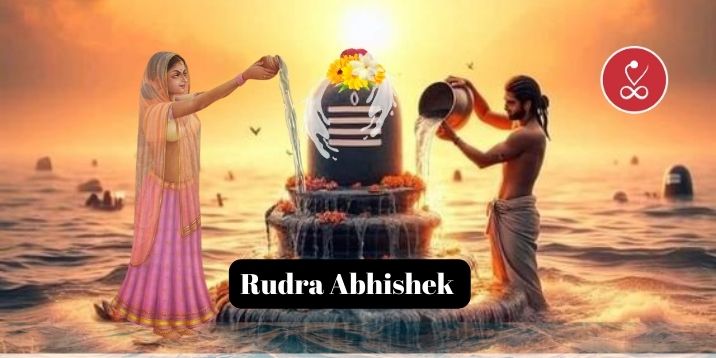What is Rudra Abhishek?
An important Hindu celebration called Rudra Abhishek is devoted to Lord Shiva, especially to his strong and powerful form, Rudra. The religious bathing (Abhishek) of a Shiva Linga, a symbolic representation of Lord Shiva, is part of this ritual. Rudra Abhishek is performed to ask Lord Shiva for blessings in a variety of areas of life, including health, wealth, prosperity, and general well-being.
Significance of Rudra Abhishek
Rudra Abhishek Puja holds immense spiritual importance. It is performed to:
- Invoke Blessings: Seek the divine blessings of Lord Shiva for health, wealth, and prosperity.
- Purification: Purify the mind and soul, remove negative energies, and eliminate past karma.
- Fulfil Desires: Achieve personal and spiritual goals, and attain peace and harmony.
- Cosmic Balance: Harmonise the energies of the cosmos, promoting overall well-being and balance.
Materials (Samagri) Required for Rudra Abhishek Puja
To perform the Rudra Abhishek Puja, gather the following materials:
- Shiva Linga: The central focus of the puja.
- Water: Pure water for the initial cleansing.
- Milk: Symbolising purity and nourishment.
- Yoghourt: Represents prosperity and progeny.
- Honey: Signifying sweetness and fulfilment.
- Ghee: Clarified butter, symbolising purification.
- Sugar: Represents sweetness in life.
- Coconut Water: Purity and devotion.
- Fruit Juices: Symbolising vitality and health.
- Bilva Leaves: Sacred leaves beloved by Lord Shiva.
- Sandalwood Paste: For anointing the Shiva Linga.
- Flowers: Fresh flowers for decoration and offering.
- Incense Sticks and Lamps: To purify the environment.
- Sacred Thread (Yajnopavita): For ritualistic purposes.
- Rudraksha Beads: Optional, for chanting and wearing.
Read Also: Who Can Defeat Lord Shiva: The Battle of Devta and Asur
Procedure (Vidhi) for Rudra Abhishek Puja
Preparation:
- Cleanse the puja space thoroughly.
- Place the Shiva Linga on a pedestal or an altar.
Invocation:
- Light incense sticks and lamps to purify the surroundings.
- Recite introductory prayers to invoke Lord Shiva’s presence.
Abhishek (Bathing the Shiva Linga):
- Water: Pour water over the Shiva Linga, cleansing it while chanting "Om Namah Shivaya".
- Milk: Follow with milk, symbolising purity and nourishment.
- Yoghourt: Pour yoghourt, invoking prosperity.
- Honey: Pour honey, symbolising sweetness and fulfilment.
- Ghee: Anoint with ghee for purification.
- Sugar: Sprinkle sugar over the shivling, symbolising sweetness.
- Coconut Water: Pour coconut water as an offering of purity.
- Fruit Juices: Bathe the Linga with various fruit juices, representing vitality.
- Bilva Leaves: Place Bilva leaves on the Linga, as they are sacred to Lord Shiva.
Mantra Chanting:
- Recite the Rudram, a set of hymns from the Yajurveda, particularly the Namakam and Chamakam sections.
- Chant "Om Namah Shivaya" continuously during the Abhishek.
Anointing and Decoration:
- Apply sandalwood paste to the Shiva Linga.
- Decorate with fresh flowers.
Aarti and Prasad:
- Perform the aarti (waving of lighted lamps) while singing hymns and bhajans dedicated to Lord Shiva.
- Distribute prasad (sanctified food) to all devotees present.
Spiritual Benefits of Rudra Abhishek Puja
- Health: Enhances physical and mental well-being.
- Wealth: Attracts prosperity and financial stability.
- Peace: Promotes inner peace and harmony.
- Protection: Shields from negative influences and misfortunes.
- Spiritual Growth: Aids in spiritual progress and liberation.
Best Time to Perform Rudra Abhishek Puja in 2024
Performing Rudra Abhishek Puja at an auspicious time can enhance its spiritual benefits. Here are the best times to perform this sacred ritual in 2024:
Read Also: 6 Sons Of Lord Shiva: Secret sons of Shiva
1. Maha Shivaratri
- Significance: Maha Shivaratri is one of the most important festivals dedicated to Lord Shiva. It is believed that worshipping Shiva on this night brings immense blessings and spiritual upliftment.
2. Shravan Month (July-August):
- Period: The entire month of Shravan (Sawan) is considered highly auspicious for worshipping Lord Shiva. This month is dedicated to Shiva and is marked by increased devotion and rituals.
Special Days:
- Mondays: Known as Shravan Somvar, Mondays during this month are particularly sacred and ideal for performing Rudra Abhishek.
- Shravan Shivaratri: The Shivaratri that falls in the month of Shravan is also a highly auspicious day.
3. Pradosh Vrat:
- Frequency: Twice a month, on the 13th day of both the waxing (Shukla Paksha) and waning (Krishna Paksha) phases of the moon.
- Timing: The puja is ideally performed during the Pradosh Kaal, which is approximately 1.5 hours before and after sunset.
4. Mondays:
- Significance: Mondays, known as Somvar, are dedicated to Lord Shiva. Performing Rudra Abhishek on any Monday is considered very auspicious.
5. Amavasya (New Moon):
- Significance: The new moon day is another auspicious time for Shiva worship. It is believed that performing Rudra Abhishek on Amavasya can remove negative energies and bring peace.
6. Purnima (Full Moon):
- Significance: Full moon days are also considered favourable for performing Rudra Abhishek, enhancing spiritual and material well-being.
Conclusion
Rudra Abhishek Puja is a highly awakening ritual that welcomes Lord Shiva's divine grace into your life. This guide will help you perform the puja correctly and with devotion so that you can benefit both spiritually and materially from it. I pray that Lord Shiva's blessings will surround you and your loved ones in 2024.




.png)

Comments